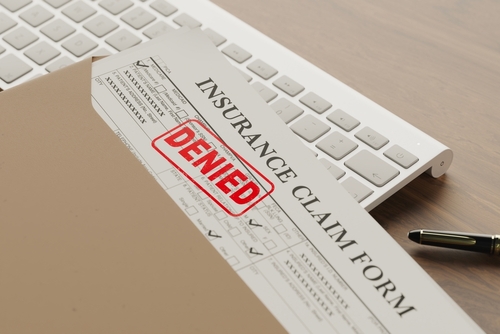A claim denial feels like a final judgment. It arrives in a formal letter after you have diligently paid your premiums, and it’s a frustrating and disheartening experience, especially when you are trying to recover from an injury.
Let’s take a step back. A denial is not the end of the road. It is the insurance company’s initial decision based on their assessment of the information they have. This is not a verdict you simply have to accept, and working with experienced Edmonton personal injury lawyers can help you challenge it effectively.
You have the right to challenge this decision. Canadian law outlines a process for appealing a denial, and it also requires insurance companies to handle your claim fairly and in good faith.
If the insurance company denied your claim, you deserve to get clear answers about your rights and options. Call MNH Injury Lawyers today at (888) 664-5298 for a straightforward conversation about your situation.
Why Do Insurance Companies Deny Claims?

- Material Misrepresentation: This occurs if there are significant inaccuracies or missing information on your original application. For example, not disclosing a pre-existing medical condition or providing incorrect information about your history could lead an insurer to void the policy.
- Policy Exclusions: Your specific policy may not cover the circumstances of your injury or the type of treatment you received. It is common for policies to have specific exclusions, for instance, denying a claim if the injury occurred while participating in a criminal act.
- Insufficient Documentation: The insurer may determine that there was not enough medical evidence to support your claim or that required forms were missing or incomplete.
- Lapsed Policy: If premium payments were missed, the policy may no longer be active, leading to a denial of any claims made against it.
- Lack of Coverage: In some cases, the reason for denial is simply that the event is not covered.
- Administrative Errors: Simple mistakes, like a typo on a form or sending the bill to the wrong provider, sometimes leads to a valid claim being rejected. While fixable, these errors cause delays and frustration.
What Does the Law Say About How Insurers Must Behave?
When you purchase an insurance policy, you are entering into a specific kind of contract. In Canada, every insurance contract includes an implied “duty of good faith.” This fundamental principle governs the relationship between you and your insurer. Choose a Personal Injury Lawyer to help hold insurers accountable if they fail to act fairly.
The Duty of Good Faith
The duty of good faith is a two-way street, meaning both you and the insurer must act honestly and fairly toward each other.
What it means for the insurer: They must investigate your claim in a fair and timely manner, assess it thoroughly, and make a reasonable decision on whether to pay. They cannot use tactics designed to unfairly delay or deny a legitimate claim. This duty to act fairly applies to every step of the process, from the initial investigation to the final decision.
What is “Bad Faith”?: A simple denial of a claim is not automatically an act of bad faith. Bad faith involves something more. The Supreme Court of Canada, in cases like Whiten v. Pilot Insurance Co., has described it as “malicious, oppressive, and high-handed” misconduct that offends a sense of decency. This includes an insurer refusing to pay without a reasonable explanation, failing to conduct a proper investigation, or intentionally misleading you about your policy.
Your Reciprocal Duty
Your duty of good faith involves providing accurate and complete information when you apply for the policy. It also means you must cooperate with the insurer’s investigation after you file a claim, for example, by providing requested documents or attending medical examinations. How Can a Lawyer support you in this stage? By guiding you through the process and protecting your rights if the insurer oversteps.
I’ve Received a Denial Letter. What Should I Do Now?
Your first actions should be calm, organized, and focused on understanding the decision and protecting your rights.
Step 1: Do Not Panic. Read the Letter Carefully.
The insurer is required to explain why your claim was denied. Read it multiple times to understand their specific reasons. Is the issue with your medical records? Do they believe a policy exclusion applies? Is it a technicality? The reason for the denial will determine the best path forward.
Step 2: Gather Your Documents.
Collect every piece of paper related to your insurance policy and your claim. This creates a comprehensive file that is ready for review. This includes:
- The complete insurance policy document. If you do not have a copy, request one from your insurer immediately.
- The denial letter itself.
- All correspondence you have had with the insurance company, including emails and letters.
- Your complete medical records, bills from healthcare providers, and any reports from your doctors related to the injury.
- A log of every phone call with the insurer. Note the date, time, the name of the person you spoke with, and a summary of what was discussed.
Step 3: Understand the Two Paths Forward.
When an insurance company has denied your claim, you generally have two options for challenging the decision: the insurer’s internal appeal process or pursuing legal action. Insurance Company Denied my Claim situations often feel overwhelming, but knowing these paths helps you decide the next step with more clarity.
- Internal Appeal: Most insurance companies have a formal internal process that allows you to ask them to review their own decision. This often involves writing a letter explaining why you believe the denial was incorrect and providing any new information that supports your case. You may have to go through one or two levels of appeal within the company.
- Legal Action: This involves having a lawyer represent you to formally challenge the denial. A lawyer manages all communications with the insurer, builds a strong case on your behalf, and if necessary, files a lawsuit to pursue the benefits you are owed. Consulting with a lawyer will help you understand which path is more suitable for your specific situation.
How Does a Lawyer Help Me Challenge a Denied Claim?

Engaging a lawyer shifts the entire dynamic of your dispute. The insurance company is now dealing with a professional who understands the legal framework, the company’s obligations, and the tactics they may use. It signals that you are serious about pursuing your claim, making Fighting the Insurance Company a more balanced process.
What We Do at MNH Injury Lawyers
- We Analyze the Denial: We start with a thorough review of your denial letter and your entire insurance policy. We identify the exact reasons cited for the denial and assess whether the insurer acted fairly and within the bounds of its legal duty of good faith.
- We Manage All Communication: You no longer have to field calls or respond to requests from the insurance adjuster. We handle all communication, ensuring your rights are protected and that the insurer is provided with precisely the information needed to re-evaluate its decision.
- We Gather the Right Evidence: A denial often happens because the insurer feels the provided evidence is not sufficient. We work to gather additional medical opinions, reports from vocational experts, and any other documentation needed to directly counter the insurer’s reasons for the denial.
- We Manage the Entire Process: Whether we are proceeding through the insurer’s internal system or preparing for litigation, we handle the paperwork, the deadlines, and the strategic decisions, allowing you to focus on your recovery.
- We Keep Them Accountable: Our primary role is to ensure the insurance company is held to its legal obligations. We work to ensure your claim is assessed fairly and that you are not unjustly blamed for any aspect of your condition or injury.
Understanding the System and Your Rights
The insurance industry in Canada is regulated to ensure fair practices.
- Provincial Regulators: In Alberta, the Alberta Superintendent of Insurance oversees the conduct of insurance companies. This regulatory body is mandated to protect consumers by regulating the industry and promoting high standards of business conduct. While it cannot typically force an insurer to reverse a specific claim decision, it monitors the industry for systemic issues and ensures companies comply with provincial insurance laws.
- OmbudServices: There are also independent bodies like the OmbudService for Life & Health Insurance (OLHI). OLHI offers a free and impartial review of complaints after you have completed the insurance company’s internal appeal process. It acts as a form of alternative dispute resolution for consumers.
- Industry Guidelines: Associations like the Canadian Life and Health Insurance Association (CLHIA) create guidelines that its member companies, which account for 99% of the business in Canada, are expected to follow. These guidelines promote consistent and fair practices across the industry, covering everything from claims processing to coordinating benefits between different plans.
Frequently Asked Questions About Claim Denials
Will my policy be cancelled if I appeal a denial?
No. An insurer cannot legally cancel your policy simply because you filed a claim or appealed a denial. They must have valid reasons for cancellation as outlined in provincial law, such as non-payment of premiums or fraud. Often, Insurance Companies Want to Settle Out to avoid lengthy disputes, but that does not give them the right to cancel unfairly.
What is the difference between a “rejected” claim and a “denied” claim?
These terms are often used interchangeably, but they can have different meanings. A rejected claim is often returned because of a technical error, like a typo, missing information, or a billing code error. These can usually be corrected and resubmitted. A denied claim is a formal decision by the insurer, after reviewing the substance of your case, not to pay based on their interpretation of your policy and the evidence.
How long does the appeal process take?
The timeline can vary significantly. An internal appeal with the insurance company might take a few months to complete. If legal action is necessary, the process can take longer, depending on the complexity of the case and whether it proceeds to court.
The insurer says my treatment isn’t “medically necessary.” Who decides that?
This is a very common point of disagreement. Your doctor provides their medical opinion on what treatment you need. However, the insurer makes its own determination based on the specific definition of “medically necessary” in your policy. A lawyer can help challenge the insurer’s interpretation by presenting stronger medical evidence, opinions from specialists, and legal arguments about why the treatment should be covered under the terms of your contract. In situations like this, it is important to Choose the Right Calgary Car Accident Lawyer who can guide you through the process and protect your rights.
What if I have coverage under more than one plan?
In Canada, there are specific rules for coordinating benefits when you are covered by more than one plan (for example, your own and a spouse’s). The CLHIA has established guidelines that most insurers follow. Generally, your own plan is the first payer. After your plan pays its portion, you can submit the remaining balance to the second plan for consideration.
Don’t Let a Denial Define Your Future

Receiving a denial from your insurance company can feel like a major setback, but it is not a final defeat. It is the start of a process. You have the right to challenge that decision and to ask for a full and fair review of your claim.
Let our team at MNH Injury Lawyers handle the burden of the appeal. We will review the insurer’s position, gather the necessary evidence, and manage the communications, allowing you to focus on what truly matters: your health and your family.
If you are ready to get answers and explore your options after the insurance company denied your claim, call us at (888) 664-5298 for a no-obligation consultation. We are here to provide clarity and support.